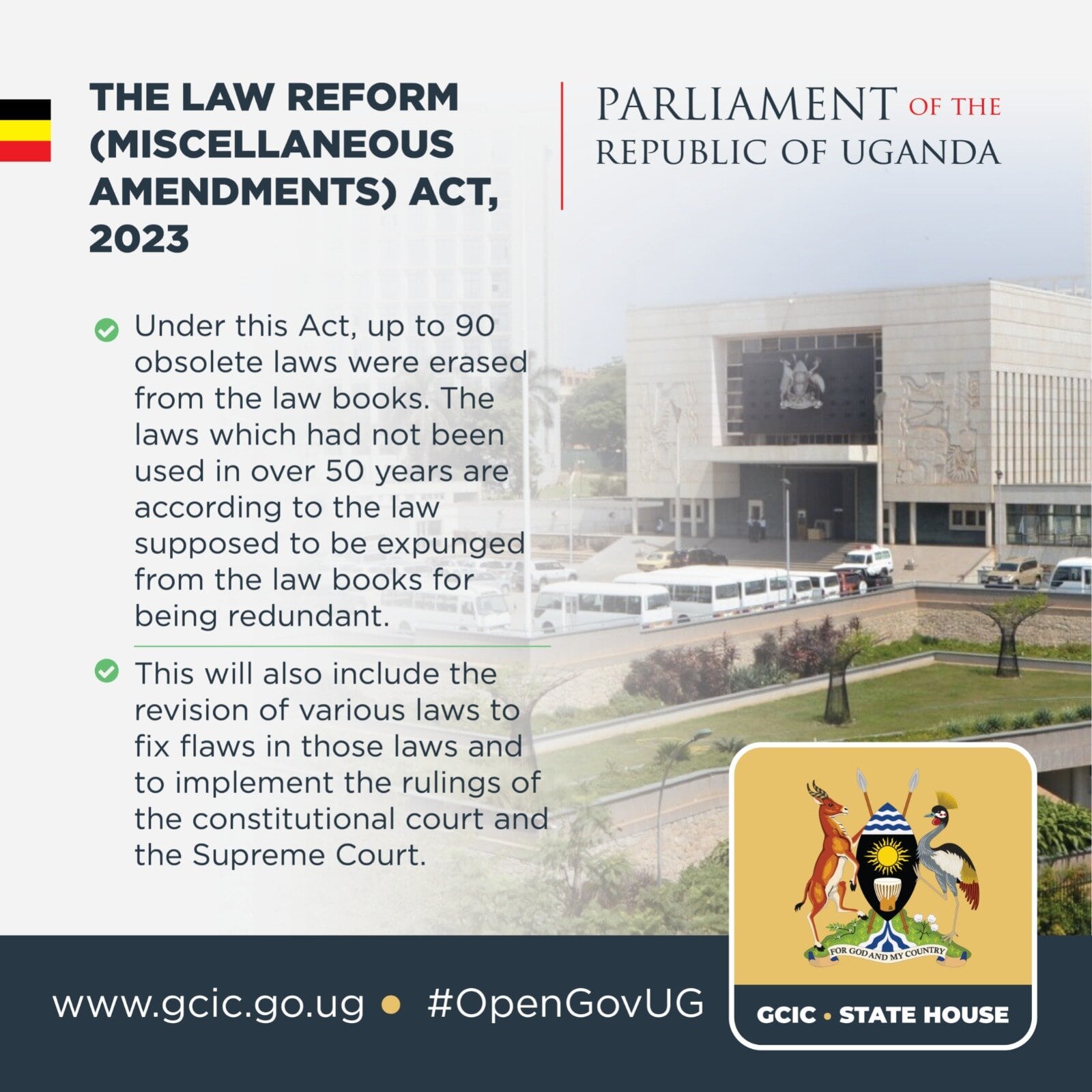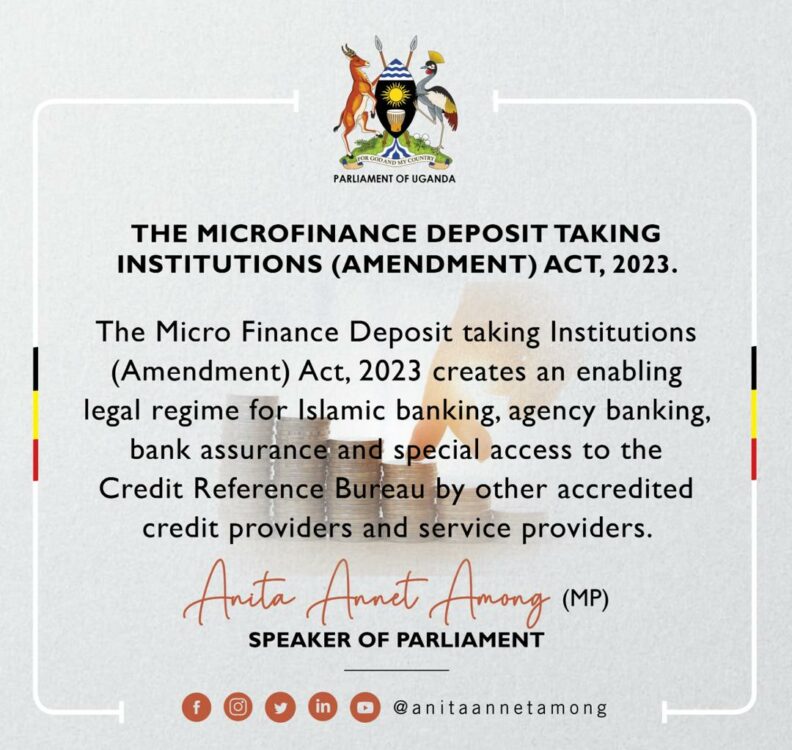The Law Revision (Miscellaneous Amendments) Act, 2023.
July 5, 2023
LEGAL ALERT
President Yoweri Museveni has assented to The Law Revision (Miscellaneous Amendments) Act, 2023. The President signed the said Bill into law on 10th May 2023.
Preview of The Law Revision (Miscellaneous Amendments) Act, 2023
The long title of the Act is;
“An Act to provide for the repeal of specified Acts; to provide for the conversion of fines and other financial amounts in specified laws to currency points; to provide for the conversion of financial amounts expressed in Pounds in specified laws to currency points; to provide for the amendment of several laws to correct the anomalies in those laws and to effect the decisions of the Constitutional Court and the Supreme Court; to transfer provisions in Finance Acts to the relevant laws and to incorporate provisions on winding up in the Collective Investment Schemes Act, 2003, the Partnership Act and the Cooperative Societies Act; and for related matters.”
A FEW HIGHLIGHTS
Repeal of 81 Acts of Parliament As listed in Schedule 1 of the Act.
Conversion and modification of fines and other financial amounts in old Acts into currency points.
Putting the Evidence Act Cap. 6 in line with the Access to Information Act, 2005; allowing litigants to adduce evidence derived from unpublished official records relating to any
matters of the State.
There’s a new provision under the Magistrates’ Courts Act Cap. 16 that; Once one is granted bail prior to committal to the High Court, that bail does not lapse as a result of the committal but this does not mean that the High Court cannot cancel that bail at any time. Its powers are not limited.
The pre-trial remand limit under the Trial on Indictments Act Cap. 23 Cap. 23 has been reduced from 480 days to 180 days for offences punishable by death and from 240 days to 60 days for any other offences.
A detailed procedure of winding up Cooperative Societies under Schedule 2 of the Cooperative Societies Act Cap. 112.
Repeal of the following sections under the Penal Code Act Cap. 120: 39 & 40 on seditious intention and offences; 161, 162, 163 & 164 on gaming houses, gaming machines, betting houses and definition of persons managing or keeping such premises; 168 on rogues and vagabonds; 50 on publication of false news; 154 on adultery.
Repeal of section 7(2) of the Administration of Estates (Small Estates) (Special Provisions) Act Cap. 156 which used to prohibit appeals to the Court of Appeal for probate suits whose subject matter is less than ten thousand shillings unless special leave is first granted by the Court of Appeal.
Introduction of a fish levy in the Fisheries and Aquaculture Act 2022, which is a specific tax levied on exporters by URA depending on the fish type. The use of the word “Commissioner” has been replaced by “Registrar of Titles” in the Land Act Cap. 227 and validation of actions under the term “Commissioner” from 2004 to date.
Under the Divorce Act Cap. 249;
- The grounds for divorce under section 4 are now fully open to either party to a
marriage, - The provisions that used to only cover husbands are now available to wives (they are
more inclusive & more gender-sensitive), - Section 26 regarding the settlement of a wife’s property, to the benefit of the husband
or the children or both, at divorce or judicial separation on account of the wife’s
adultery has been repealed
Creation of the Parliamentary Budget Office under the Administration of Parliament Act Cap. 257 and providing for the remuneration of members of Parliament save for those who are also members of the UPDF who can only benefit from this if they are earning less from UPDF.
Section 14 of the Parliament (Powers and Privileges) Act, Cap 258 has been repealed so it is no longer mandatory for anyone to seek leave of Parliament before giving evidence of proceedings in Parliament or in a Committee of Parliament.
The Police Act, Cap. 303; section 27A (2) and (3) has been repealed as well as section
32(2) and (3)
An extract of part of section 27A is as follows;
27A. Procurement of information and attendance of witness
(1) A Police officer not below the rank of assistant inspector of police making an
investigation into an offence may, in writing—
(a) require the attendance before him or her of any person whom he or she has reason
to believe has any knowledge which will assist in the investigation; and
(b) require the production of any document, matter or thing relevant to the of
fence under investigation.
(2) The attendance required under subsection (1) may be required at the near
est police station or police office situated within the area in which that person re
sides or, for the time being, is found.
(3) Subject to subsection (4), where a person requested to attend or to pro
duce a document or other matter or thing under subsection (1) without reason
able excuse—
(a) Fails to attend as required;
(b) Refuses, having so attended, to give his or her correct name and address;
(c) Refuses to produce any relevant document, matter or thing which may be
in his or her possession or under his or her authority;
(d) refuses to answer truly any question that may be lawfully put to him or
her, that person commits an offence and is liable, on conviction, to a fine
not exceeding forty thousand shillings or to imprisonment for a term not
exceeding three months, or both.
(4) A person shall not be required to answer any question under this section
which might tend to expose him or her to any criminal charge, penalty or
forfeiture.
Section 32(2) of the Police Act which was empowering the IGP to prohibit the convening of any assembly or forming of any procession if the IGP has reasonable grounds for believing that the assembly or procession is likely to cause a breach of the peace.
Section 32(3) of the Police Act which was allowing the IGP to delegate the powers
enshrined in subsection (2).
Section 4(a) of the Uganda Printing and Publishing Corporation Act, Cap. 330 which provides for the objective of the Corporation being “to turn the Government Printer into
an effective and efficient resource” has been repealed.
Section 1(a) of the Hides and Skins (Export Duty) Act Cap. 339 which defines “game hide”
has been repealed.
A new tax has been levied on the exportation of hides and skins at a rate of US$ 0.80 per kilogram; to be collected by URA hence the repeal of Section 6(1) and the First Schedule which were providing for the rates as well as the powers of the Minister in this regard.
There is no more bail pending appeal for members of the UPDF who are being prosecuted
under the Uganda Peoples Defence Forces Act, 2005 because section 231 of the Act
has been repealed.
Section 248 (b) (i) and (ii) of the UPDF Act have been repealed therefore there is no more
granting of bail to convicted persons pending revision.
Repeal of section 58 of the Partnerships Act, 2010 has been repealed so the provisions
of the law relating to the winding up of an unregistered company under the Companies
Act with necessary modifications, to the winding up of a partnership under this Act will
no longer apply.
The Tax Procedures Code Act, 2014 has been amended to provide for recovery of tax
from a successor in business and to impose a minimum notice period of thirty days prior to discontinuance of a business and this notice is supposed to be given to the Commissioner General.
The same Act has been amended to provide for the tax liability of corporations.
Customs duty is also to be levied on goods for use by the Government.
Section 43A of the TPCA has also created a new duty for URA to issue certificates of origin as required under the EAC Customs Management Act, 2004.
The COMESA Treaty (Implementation) Act, 2017 has introduced a new definition of import duty in line with that of the East African Community Management Act, 2004 and it has also been amended under section 5A to provide for the tariffs to be levied on goods from COMESA.
The External Trade Act, Cap. 88 has been amended to provide for a commission of 2% of the value of the imported goods save for exempted goods and goods which are zero-rated.
A Surtax has also been imposed in addition to the normal taxes to be levied on imports in the 2nd column of the schedule to the Act that is; for imported waters including spa waters, aerated waters, lemonade, flavored spa waters, ad flavoured aerated waters, beer made from malt, still wine, grape must, not in bottle, other sparkling wine, whisky.
The Income Tax Act, Cap 340 has been amended to provide for dividends earned from a company which came into existence through stock exchange.
The Uganda Communications Act, 2013 has been amended to introduce a license fee for all persons who own satellite receiver equipment in Uganda. Such persons will henceforth be required to pay 15 currency points (Ugx. 300,000) before such a license can be granted.
The Roads Act, 2019 has been amended to impose road user charges on foreign-registered vehicles for every 100km covered in Uganda. Particularly; buses will be subjected to 5 dollars, trucks with 3 axles will be subjected to 6 dollars and trucks with more than 3 axles will be subjected to 10 dollars.
Section 25 of the Computer Misuse Act, 2011 has been repealed. This was the section that criminalized the use of electronic communication to disturb the peace, quiet or right of privacy of any person.
The Public Order Management Act, 2013 has been amended to repeal section 8 which used to provide for the powers of an authorized officer to stop or prevent public meetings, order the dispersal of public meetings having regard to the rights and freedoms of such persons in respect of whom such orders were made and it criminalized defiant persons.
The Anti-Pornography Act, of 2014 has also been amended to repeal sections 2, 11, 13 and 15. Section 2 was the Interpretation Section, section 11 used to stipulate the powers and duties of the Anti-Pornography Enforcement Committee, section 13 used to define and criminalize pornography and section 15 was empowering Court to issue warrants for the seizure of pornographic materials/ objects.
Specified Acts have been amended to provide for the definition of a currency point as assigned to each of those Acts as shown in schedules 2, 3 and 4 of the Law Revision (Miscellaneous Amendments) Act, 2023.
The Transitional provision of this Act is to the effect that where there are any court proceedings for the prosecution of the offences that have been repealed under this Act, those proceedings shall automatically terminate at the commencement of this Act. Accordingly; where the accused persons are in custody or remand, they shall be unconditionally released.
In summary, a total of 81 Acts have been repealed under schedule 1,
a) There is a conversion of fines and other financial amounts to currency points in 55 specified laws under schedule 2,
b) Fines and other financial amounts in the Penal Code Act have been converted to currency points in schedule 3,
c) Under schedule 4, we see a conversion of fines expressed in shillings in 19 specified laws to currency points
d) modification of low fees, costs and values in 6 laws that have been in force since the 15th of May, 1987
e) there has been a conversion of financial amounts expressed in pounds in 6 specified laws, to currency points.
Below are some of the comments from the public regarding this new law;
The Act has been put in place to facilitate the process of preparing the Revised Edition of the laws of Uganda by making amendments to the specified laws, where the amendment can only be affected using an Act of Parliament.
The current edition of the Laws of Uganda was published in 2000. Over the 22-year period, there have been a lot of amendments made to the laws of Uganda. To this end, ninety Acts of Parliament have been identified for repeal. These include Acts that were affected by the Government policy on liberalization of trade, laws that have become redundant due to the passage of time, laws that have been superseded by other laws and laws that have served their purpose and are therefore spent.
The object of the Act is to, among others, “provide for the repealed specified acts, to provide for the conversion of fines and other financial amounts specified in currency points and to provide for the conversion of financial amounts expressed in [British] pounds”.
Other reasons for the recent revisions, were to “provide for the amendment of several laws
to correct the anomalies in those laws and to effect the decisions of the Constitutional
Court and the Supreme Court…”
Under the Trial on Indictments Act and the Magistrates Courts Act, for instance, were provisions that required accused persons to be released on bail if they have been detained without commencement of trial for 480 days in the case of capital offences and 240 days in case of other criminal offences.
Those provisions were, however, declared unconstitutional as they go against Article
23(6) (b) of the Constitution which makes a different pronouncement on the matter. “In the case of an offence which is triable by the High Court as well as by a subordinate court, if that person has been remanded in custody in respect of the offence for 60 days before trial, that person shall be released on bail on such conditions as the court considers reasonable,” the article states.
The revisions saw the deletion of those sections that are not in line with the Constitution. The Administration of Parliament Act has been brought in line with Article 85 of the Constitution, and the MPs who are representing the UPDF, their Parliamentary salary will be paid differential to the amount by which their Parliament pay is less by the one from the army.
The last such revision occurred in 1994 and since then, several statutes or sections of laws were declared unconstitutional but were still in the law books for want of revision. One such provision is Section 50 of the Penal Code Act, which criminalized the publication of false news but was declared unconstitutional in the case of Charles Onyango Obbo & Anor v Attorney General.
There are several Acts of Parliament that come and repeal their predecessors and were also declared unconstitutional, like the Budget Act that was repealed under the Public Finance Management Act, which repeal was effected at the enactment of this Act.
Up to 90 obsolete laws were erased from the law books with Attorney General, Hon. Kiryowa Kiwanuka saying; “laws that have never been applied or used in over 50 years are to be expunged from the law books for being redundant.”




